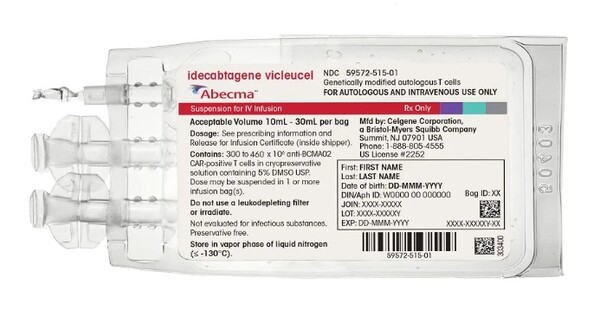BMS has successfully completed a confirmatory clinical trial of its chimeric antigen receptor T (CAR-T) cell therapy, Abecma (idecabtagene vircleucel; ide-cel), moving closer to formal approval from the U.S. Food and Drug Administration (FDA).
However, steps have yet to be taken to authorize and release Abecma in Korea.

Abecma, jointly developed by BMS and Bluebird bio, is the first CAR-T cell treatment that received fast-track approval to treat multiple myeloma.
In March 2021, it won fast-track approval from FDA based on its KarMMa-2 study on patients with recurrent and non-responsive multiple myeloma who had been treated four or more times previously.
On Feb. 10, two years after the quick approval, the researchers released their phase 3 clinical trial, which showed Abecma’s superiority to standard treatments as a result of conducting a trial on recurrent and unresponsive multiple myeloma patients, in the New England Journal of Medicine, raising expectations of formal approval.
KarMMa-3 study was conducted on 386 patients with recurrent and unresponsive multiple myeloma who had received two to four treatments and did not respond to their final treatment, randomly allocating Abecma or one of the five standard treatments at a ratio of two to one and comparing efficacy and safety. The primary evaluation variable was progression-free survival (PFS), and the secondary assessment variable was overall survival (OS) and overall response (OR).
As a result, based on 18.6-month follow-up tracking, the Abecma group showed a median PFS (mPFS) of 13.3 months, reducing disease progress or death risks by 51 percent compared to 4.4 months of the standard treatment groups.
OS was 71 percent for the Abecma group, 42 percent for standard treatment groups, and complete remission (CR) was 39 percent vs. 5 percent.
Compared to the KarMMa-2 study result released at the American Society of Hematology (ASH) last December, which showed OS of 73 percent and mPFS of 8.8 months, the latest result was similar in OS and superior in mPFS.
“For recurrent and unresponsive multiple myeloid patients with limited treatment options, Abecma has proved a longer PFS and lower disease progression and death risks,” researchers of the KarMMa-3 study said. “The result will brighten the outlook for formal approval and provide patients with applicable options.”
It was noteworthy to provide a new option for the fifth treatment of multiple myeloid patients, most of whom have depleted all existing treatment options.
However, the new drug is a pie in the sky for Korean patients.
Considering the characteristics of CAR-T cell therapy, it is impossible to prescribe it unless a related company introduces it to Korea. According to sources, however, BMS Korea has yet to make any moves to introduce it to the country by, for instance, preparing for its domestic approval.
The possibility remains, though.
The sources cited that BMS Korea CEO Lee Hye-young said last year that she was “interested in introduction CAR-T therapies as soon as possible, positively considering such possibility continually.”

